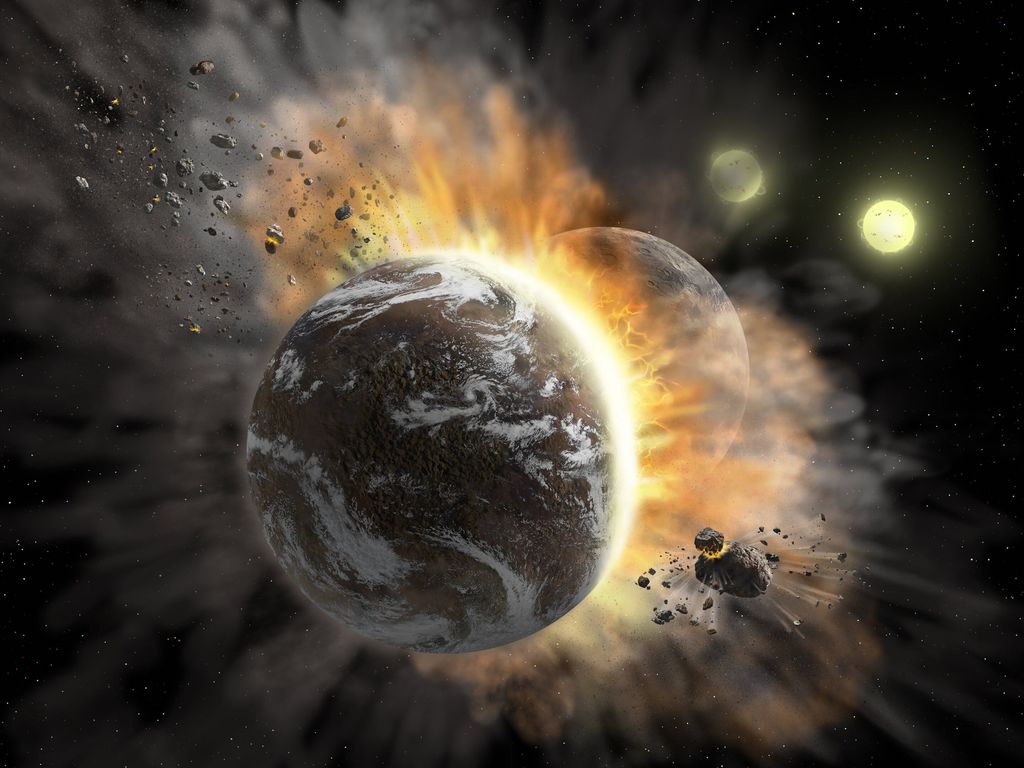Welcome to DU!
The truly grassroots left-of-center political community where regular people, not algorithms, drive the discussions and set the standards.
Join the community:
Create a free account
Support DU (and get rid of ads!):
Become a Star Member
Latest Breaking News
General Discussion
The DU Lounge
All Forums
Issue Forums
Culture Forums
Alliance Forums
Region Forums
Support Forums
Help & Search
Science
Related: About this forumIn a Distant Galaxy, Colliding Exoplanets Are Upending What We Knew About Solar System Formation
By Brandon Specktor - Senior Writer a day ago Space
Looks like planets can smash into each other much later in life than astronomers thought.

Astronomers are pretty sure they're witnessing the aftermath of two large exoplanets smashing into each other in a distant, binary solar system (illustrated here).(Image: © NASA/SOFIA/Lynette Cook)
Solar systems form in a school of hard knocks.
Take ours, for example: Earth had barely cooled 4.5 billion years ago when it got slapped in the face by a renegade Mars-size rock, reducing both bodies to giant balls of lava. Scientists believe this cosmic collision spewed so much debris into the air that it eventually coalesced into Earth's moon — a beautiful partnership born from chaos.
Collisions like these are common in young solar systems, but become much rarer as time rolls on: Large planets fall into line and host stars either swallow or blow away smaller chunks of debris. Now, NASA astronomers think they may be witnessing a violent exception to that pattern in a solar system far, far away.
In the star system BD +20 307 — a binary system roughly 300 light-years from Earth — it appears that two Earth-like exoplanets have crashed into each other, erupting in a hot cloud of dust and debris that's visible to infrared telescopes. At more than 1 billion years old, the solar system being observed is fully mature, but according to conventional wisdom, that means it should not host planetary smashups like this one. This never-before-seen type of collision suggests that solar systems, like people, can still struggle to pull themselves together late in life.
More:
https://www.livescience.com/exoplanet-smash.html
InfoView thread info, including edit history
TrashPut this thread in your Trash Can (My DU » Trash Can)
BookmarkAdd this thread to your Bookmarks (My DU » Bookmarks)
4 replies, 797 views
ShareGet links to this post and/or share on social media
AlertAlert this post for a rule violation
PowersThere are no powers you can use on this post
EditCannot edit other people's posts
ReplyReply to this post
EditCannot edit other people's posts
Rec (5)
ReplyReply to this post
4 replies
 = new reply since forum marked as read
Highlight:
NoneDon't highlight anything
5 newestHighlight 5 most recent replies
= new reply since forum marked as read
Highlight:
NoneDon't highlight anything
5 newestHighlight 5 most recent replies
In a Distant Galaxy, Colliding Exoplanets Are Upending What We Knew About Solar System Formation (Original Post)
Judi Lynn
Oct 2019
OP
VMA131Marine
(4,136 posts)1. Note to the OP
A distance of 300 light years does not put this system in another galaxy. To the contrary, this is in our local neigbourhood.
Foolacious
(497 posts)4. That's actually the headline of the article on LiveScience...
who should definitely know better.
SCantiGOP
(13,867 posts)2. If the planets were populated by intelligent beings
I would imagine they would know this end was coming thousands of years before it happened. Maybe they accelerated their science programs and got away. Or maybe they just sat back, prayed and watched a hell of a show.
tblue37
(65,227 posts)3. K&R & thanks. nt